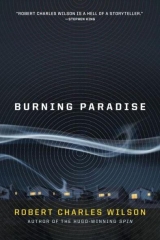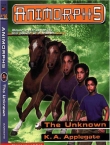
Текст книги "Burning Paradise"
Автор книги: Robert Charles Wilson
сообщить о нарушении
Текущая страница: 14 (всего у книги 20 страниц)
22
 MAZATLÁN, MEXICO / ANTOFAGASTA, CHILE
MAZATLÁN, MEXICO / ANTOFAGASTA, CHILE
“WERE THEY THERE?” NERISSA DEMANDED.
Cassie and Thomas, she meant. Ethan had just come back from the street near the mail drop. He said had been loitering there, watching traffic in the calle before making an approach, when he heard a pistol shot. He had fought his way through the crowd to the place where a wounded sim was dying, oozing fluids onto the sidewalk in front of a tourist shop. But he hadn’t been able to see the attack as it happened. “I don’t know who was involved,” he said.
Could Cassie have been there? Nerissa couldn’t picture her niece with a handgun, but the boy with whom she had left Buffalo, Leo Beck, was probably reckless enough to carry one. “So what do we do?”
“We go on,” Werner Beck said flatly, before Ethan could answer.
So they went on. Because Beck said so. Even though, in Nerissa’s opinion, Werner Beck was subtly mad.
She had been exercising a grim patience, cooperating with Beck because Beck had money for travel and a plan that might re unite her with Cassie and Thomas. Or at least with Beck’s son, Leo. It was possible that every step she took was carrying her farther from her niece and nephew, but it was equally possible (she hoped likely) that she had begun to close in on them—thus her patience.
But Ethan’s news about the killing of a sim unhinged all that studied calm. She wanted to run into the street and look for Cassie and Thomas, wanted to call out their names. She restrained herself from making that or some other stupid and impulsive gesture. Because, at least in this, Beck was probably right. The best they could do was to go to Antofagasta and make the connection there. Because that was where Leo was headed. Assuming no sims interfered. Assuming Cassie and Thomas survived the journey.
And then what? A chilling thought occurred to her: What if Cassie had acquired through Leo a dose of Werner Beck’s madness?
Because it was madness—she was increasingly sure of that.
Beck bought seats on a commercial flight to Santiago with a connection to Antofagasta. Their documents were cursorily examined as they moved through the airport, and the aircraft they eventually boarded was a sleek Fanaero United four-prop liner that stood into the cloudless sky and made a banking turn to the south.
Nerissa longed to discuss her fears with Ethan, but they had enjoyed very little privacy since they had arrived on Werner Beck’s doorstep. She could tell Ethan’s faith in Beck had been shaken by prolonged exposure at close quarters. “He’s not the man I knew ten years ago,” Ethan had admitted when they had a rare moment alone. “But no one else knows what he knows or has his kind of leverage.”
Maybe so, but what had Beck really accomplished? He talked about a worldwide network of researchers and proto-soldiers, all primed to confront the hypercolony and to destroy its facility in the Atacama desert, which was wonderful, and maybe, at a stretch, even plausible, but the details were suspiciously sparse. Beck had offered Wyndham in England as a typical researcher, and he had cited Eugene Dowd, the man Cassie and Leo and Thomas were supposedly traveling with, as a typical soldier. But that hardly constituted an army. And it was little more than speculation on Beck’s part that an attack on the Atacama site, even if it succeeded, would materially damage the hypercolony. There could be other such facilities elsewhere in the world. Beck said not—but pressed to explain his reasoning, he became evasive.
He had been generous with his money over the years, but according to Ethan it was money he had more or less inherited; all Beck himself had done was to create a network of front companies and dummy accounts that allowed him to administer his own income without leaving an obvious electronic trail. And she wondered how secure that income stream really was. Beck’s safe house had been a little shabby, and so was his customary wardrobe of tweed jacket and denim trousers.
None of this amounted to madness, but how should she parse his style of conversation (mannered and condescending), his monomania, his obsessive attention to the minutiae of privacy and security? All the surviving families of the victims of ’07 shared these traits, to one degree or another, but at least they had tried to build lives outside the boundaries of their necessary paranoia. Beck was entirely enclosed by it. Even Ethan, whose isolation in his Vermont farmhouse had been nearly as complete as Beck’s, had managed to retain his sanity—maybe because he was objective enough to question it. Beck allowed himself no such unmanly doubts.
And that was the crux of the matter. Beck was impervious to doubt. He believed in his army of followers, his implacable enemy, and his invincible strategy; and to question any of that was not only stupid but, in Beck’s eyes, a betrayal so heinous as to be unforgiveable.
Ethan, dozing next to the window, had left Nerissa with instructions not to wake him. The flight attendant served lunch as the plane curved over the Pacific west of Panama, but it was typical airline fare; he wasn’t missing anything. She found her attention drawn to Beck’s tray as he ate—the way he tugged the foil cover from the tray and folded it in thirds, likewise the wrapper from which he had extracted the cutlery. He took a sip from his thimble-sized cup of black coffee after every four bites. She counted. Four bites. Sip. Four bites. Sip. It was metronomic.
“What are you looking at, Mrs. Iverson?”
She jerked upright like a guilty schoolgirl. “Nothing… sorry.”
Beck glanced at Nerissa’s tray, now a clutter of torn packaging and half-eaten food. “The attendant should be around shortly to pick that up.”
She forced a smile and hoped it would end the conversation. Beck shifted his gaze to her face, but his expression of disgust hardly changed. “Since we have a moment, can I say something?”
“Of course.”
“I want to put this to you directly. Bluntly. Because it’s obvious you’re skeptical about what I mean to do in Chile.”
“I wouldn’t say—”
“All you want to do is reclaim your niece and nephew. And I have no problem with that. You’re not a soldier, and neither is Cassie or Thomas. If they’re in the company of Leo, they’re only an impediment to his work. Taking them back to the States is probably the most useful service you could perform.”
Wake up, Ethan! Nerissa thought. But Ethan didn’t stir. The plane lurched through a patch of turbulent air and she reached out to steady her coffee cup.
“But you’re wrong about what we’re doing in the Atacama. Others have expressed similar reservations. I’ve heard the argument for accommodation more often than I care to remember, though less often since 2007—the idea that the hypercolony has given us something valuable in exchange for a trivial diversion of resources. The idea that interfering with that puts both parties at risk and even constitutes a threat to world peace. I have to say, it’s a contemptible attitude.”
“I saw my sister and her husband murdered. I’m not inclined to forgive that.” Where was the flight attendant? The entire plane seemed to have been enveloped in a kind of sunny afternoon coma.
“I know. But you’ve wondered, haven’t you, what we stand to lose if I’m successful?”
Sure she had wondered. If it was true that the hypercolony had molded the world the way a potter works wet clay on a wheel—if it had actually coaxed prosperity out of poverty and made a tractable chorus of the world’s discordant human voices—then yes: “Of course I wonder about the consequences.”
“As I see it, humanity will be forced to take responsibility for its own future.”
“For better or worse.”
“All of us who survived 2007 bear a heavy burden. People around us are allowed to go about their lives, while we carry this unspeakable knowledge. So we try to cope. We do what we have to do. You’ve elected to stand back and look after the children while others fight. That’s your choice, and it’s a good and useful one. But as a civilian, the consequences of what we do are not your concern. You need to let the soldiers fight the war.”
Between planes at Pudahuel Airport they sat in a lounge nursing drinks—mineral water for Beck, beer for Ethan, rum and Coke for Nerissa. She passed the hour between flights listening to an English-language news broadcast on a TV set behind the bar.
Was the control of the hypercolony already faltering, as Winston Bayliss had suggested? More Russian and Japanese troops and gunships had been dispatched to Magadan on the Sea of Okhotsk. There was footage of brick buildings collapsing under mortar fire. Such outbreaks were not altogether unknown and were usually tamped down as soon as they started, but this one might be different. The diplomatic saber-rattling continued to intensify and the League of Nations seemed helpless to intervene. Shattered walls, broken bodies: was that what the world would look like in five or ten or fifty years?
She stole another glance at Beck. Give him his props, Nerissa thought. He was a clever and persuasive salesman. As toxic and as fraudulent as his worldview might be, he had successfully peddled it to a number of intelligent people, apparently including Ethan.
In other words, he was a natural leader. But maybe that was what had made the last century so peaceful: an enforced vacation from natural leaders. And if the hypercolony were destroyed they would come storming back—our Napoleons, she thought. Our Caesars. Our terrible and rightful rulers.
A smaller single-prop plane carried them from Santiago to Antofagasta, and as it bent down to the Cerro Moreno runway strip she caught her first glimpse of the coastal mountains that bordered the high salt desert of the Atacama.
The driest place on Earth. More than forty thousand square miles of sand, salt and ancient pyroclastic debris. A great place to put an observatory, if anyone had been funding observatories, because the skies were so consistently clear.
It was the place (if Beck was to be believed) in which the hypercolony had built its breeding ground. She tried to imagine that entity, to think about it without hatred or fear. Perhaps the way Ethan thought of it, as an organism of great age and complexity. It was intelligent, Ethan and Beck believed, but not self-aware. It didn’t think, in human terms, but it calculated. It was like the computers the utility companies used, but infinitely more subtle, programmed by its own unfathomably long evolutionary history.
And out there in the Atacama it had assembled some means to deliver itself to new, distant worlds. Using rockets, maybe, like the ones in the paperback science-fiction novels Cassie used to jam into her schoolbag, or something better than rockets. Something to do with beams of light. Something that could be constructed only with the resources of a technologically adept culture.
If you looked at it that way the hypercolony wasn’t really an enemy, at least in the sense of a malevolent, conscious opponent. And maybe that was what Beck had failed to understand. There was no more malice in the hypercolony than there was in a natural disaster… and it wasn’t even necessarily a disaster, Nerissa thought, except for those of us who, like willful children, poked our fingers into the lethal business of the hornet’s nest.
Antofagasta was a busy industrial city. Copper refineries and cement factories etched parallel lines of smoke on the northern sky; a huge port dominated the harbor. Nerissa, Ethan and Beck took a taxi from the airport to a three-bedroom row house on the fringe of the hotel district.
Night had fallen by the time they finished unpacking. Ethan turned on the TV, and a Televisión Nacional newscast began to repeat what Nerissa already knew about the fighting in Magadan. She crossed the street to a tiny Líder store and exchanged some of the pesos they had bought at the airport for basic groceries. Back in the kitchen she fried fish and vegetables for three but ended up eating very little of it herself. Her appetite had been fragile since she left Buffalo and she had lost a few pounds already.
There was no evidence of the army Beck had said would be waiting for him. No cryptic messages, no hooded partisans knocking at the door. When she asked him about that, Beck said he’d contact “some people” tomorrow. And Nerissa carefully refrained from rolling her eyes.
She and Ethan shared a bedroom. What made this especially unsettling was that to night might be one of their last nights together. Sooner or later Ethan would be off to the interior of the Atacama, Sancho Panza to Beck’s Quixote, and with any luck she’d be back in the States with her niece and nephew. She might not see Ethan again even if he survived. She wanted him to survive, of course, but did she want something more than that? How much of their shipwrecked marriage might it be possible to salvage? If they were together under less dire circumstances, if they were granted time enough to discover what they had become after seven years of separation… what might be possible?
He opened the curtains and turned down the bed. Nerissa repeated some of what Beck had said on the airplane and asked Ethan bluntly whether he still believed in Beck’s plan.
Ethan frowned. Even that small gesture was hauntingly familiar. The creases at the corners of his eyes. The buckled V between his brows. “I think it has a chance.”
“So you buy all that stuff about radio waves?” Nerissa understood the concept only vaguely, but Beck claimed to have isolated key frequencies at which the orbital cloud of the hypercolony communicated with itself. He believed he could disrupt those signals—not globally, but locally, at the Atacama site. Which would have the effect of isolating the Atacama facility from the orbital hypercolony. Which would render the resident simulacra inert, perhaps even kill them. Supposedly.
“It wasn’t just Beck who did the research. If he can suppress activity at the site long enough, then yeah, we can get inside and damage it. Whether that will have any lasting effect is hard to say. It depends on which theory of the hypercolony’s life cycle you accept.”
“So even if it works, nothing might happen.”
“I’m pretty sure something will happen.”
“But the hypercolony might have a way of defending itself.”
“Also possible.”
“But you think it’s worth doing?”
He shrugged.
Lying in bed, exhausted but sleepless, she found herself recalling a film Ethan had shown her years ago. A home movie, basically, made by one of his undergraduate students during a research trip to Japan. Ethan had been working with a nest of Asian giant hornets, insects that were also called “yak-killers”—the species was responsible for an average of forty human deaths every year. This particular nest was in a forest close to a settled community in Kanagawa Prefecture, and it would have to be destroyed once Ethan had secured specimens. Ethan approached the nest in protective clothing as carefully sealed as a diving suit. His face through the plastic visor looked tense but not frightened, and his movements were calculated, deliberative. Respectful was the word that came to mind.
As he approached the nest it detected his presence and reacted to it. Dozens of wasps swarmed out and darted directly at him. The camera wavered but the cameraman stood his ground; two of Ethan’s other students panicked and ran. Ethan did not. Even as the fist-sized hornets clustered on his visor, struggling with the selfless lethality of a suicide bomber to reach his face, he went about his work. And when he was done taking samples, he poisoned the nest with the same impersonal efficiency.
She woke an hour before dawn from a terrible dream. In the dream Ethan had been back in Japan, but the hornets were as big as people and they had faces like the face of Winston Bayliss. She came to herself (I came to myself in a dark wood where the straight way was lost) convinced she had heard some ominous noise, but when she went to the window there was no one in the alley behind the house, only a cat digging through a drift of refuse. “Don’t go,” she said.
She wasn’t sure whether she meant to wake him. She heard him turn over in the bed.
“Don’t go. The only reason you can’t see how crazy this is is that we’ve been neck-deep in crazy for years. Beck is delusional. There is no army. He doesn’t know what’s out there in the desert or where it came from or what it wants or how it can hurt you. Don’t go.”
Enough of the ambient light of Antofogasta seeped through the window that she could see his head against the pillow, eyes closed. She assumed he was asleep, but he startled her by saying, “Come back to bed.”
“Ethan?”
He didn’t move. Maybe he still wasn’t altogether awake. “I don’t have a choice, Ris.” His voice thick, words like an extended sigh. “This is what I have to do. There’s nothing else. Come back to bed.”
The cat pricked its ears and chased something invisible down the alley and out of sight. Nothing else moved. The air itself seemed sterile and empty. Then I’ll find my own way home, she thought.
23
 CROSSING THE EQUATOR
CROSSING THE EQUATOR
THEY FOLLOWED THE HIGHWAY IN TWO vehicles: Eugene Dowd’s white van, with Dowd and Beth in it, and a sky-blue Ford Concourse Dowd had rented with the promise that he would return it to the rental agency’s Valparaiso branch. Cassie took turns at the wheel with Leo, occasionally checking the mirror to see if they were being followed.
The Trans-American Highway was an advertisement for the success of the Pan-American Common Market. It passed through some of the hemisphere’s most rugged and beautiful terrain, and it was a feat of large-scale multinational engineering to rival the Channel Tunnel, the Danyang–Kunshan Bridge, or the Jordanian desalinization towers. Under other circumstances Cassie might have relished the trip. As it was, her connection with Leo Beck made it at least bearable.
Had she adapted to Leo, or was it the other way around? But it seemed to Cassie that there was no compromise in their unfolding relationship, only a series of surprising discoveries. Cassie had been with boys before, on what she preferred to think of as an experimental basis. Well, two boys. There had been Rudy Sawicki from high school, a math prodigy with bad skin who was nevertheless sweet and gently lascivious when they were alone together. But he wasn’t Society, and their relationship had collapsed under the weight of unspeakable truths. And there had been Emmanuel Fisher, whom everyone called Manny: he was Society, and for a year they had seen each other every weekend. But the closer she got to Manny, the more he felt entitled to make decisions on her behalf or to overrule decisions she had made. Eventually, after a trivial argument about homework, he had called her a bitch and thrown her copy of Wuthering Heights against the wall so ferociously that the school librarian complained about the broken spine. By mutual consent, they hadn’t dated after that.
From a distance Leo Beck had seemed like just another nervy, chain-smoking Society boy. Undoubtedly that was what Beth had imagined him to be. (Cassie was tempted to wonder what Leo had seen in Beth, but that was a mean thought.) So it had surprised her to learn that Leo was a habitual reader; it had surprised her to see how easily he related to Thomas. In bed, during the few but precious opportunities they shared during the drive south, Leo was gentle when she wanted him to be and fiercely eager at exactly the right moment—and he was good company afterward. With Leo beside her she could sleep soundly, even in a dark room in a strange country. As her eyes closed he kissed her ear or her forehead and whispered, “Sleep well.” Simple, comforting words. She cherished them. You too, she thought. Sleep well, Leo.
The Trans-American Highway crossed the Darien Peninsula on the Pacific side of the peninsula’s mountainous spine. Often she could see the highway winding ahead of them, a high steel ribbon where it spanned marshes and gorges or hugged rocky scarps, though as acts of engineering the tunnels were even more impressive, cutting through massive rock-faces as cleanly as a bullet. As the day approached noon Dowd signaled his intention to pull over at the next rest stop, which turned out to be a wide space at the side of the road featuring a cafeteria, four pumps marked GASOLINA SINPLOMO, a gift shop, and a view that rivaled anything Cassie had ever seen in Aunt Ris’s back issues of National Geographic.








